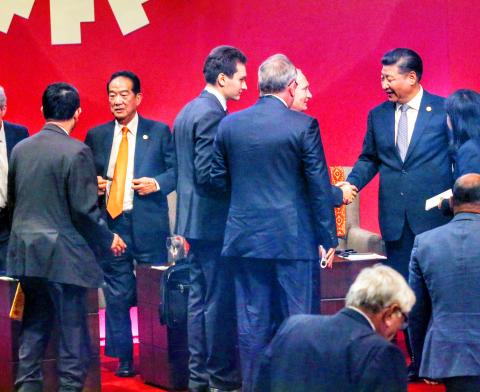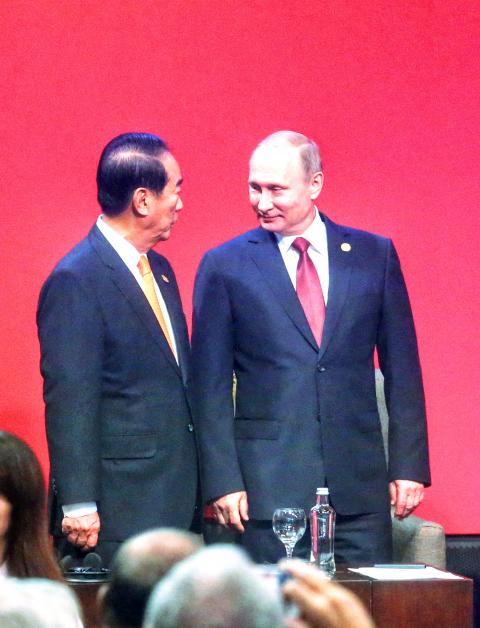People First Party (PFP) Chairman James Soong (宋楚瑜), Taiwan’s envoy to the APEC summit, talked with Chinese President Xi Jinping (習近平) for 10 minutes about cross-strait trade and economic issues in Lima, Peru, on Saturday, a member of Taiwan’s delegation said.
PFP Legislator Lee Hung-chun (李鴻鈞) said that Soong took advantage of a delay of the APEC Business Advisory Council meeting to engage in talks with several leaders, including Xi, Russian President Vladimir Putin, Japanese Prime Minister Shinzo Abe and Philippine President Rodrigo Duterte.
Lee said Soong’s conversation with Xi occurred naturally following their encounter at the venue, adding that they shook hands and sat to discuss policy issues, with Soong expressing the hope that China will resume cross-strait economic exchanges, especially those that benefit Taiwan’s small and medium-sized enterprises.

Photo courtesy of the Chinese Taipei APEC delegation
Soong and Xi agreed on the topics and they are to separately issue news releases detailing the contents of their conversation, Lee said.
Because of the two men’s “good personal relationship,” Xi noticed that Soong was wearing the same orange tie he wore at their meeting in Beijing in 2014, Lee said.
Soong and Xi did not mention the so-called “1992 consensus” or the “one China” principle, because President Tsai Ing-wen (蔡英文) did not authorize Soong to broach those subjects, Lee said.

Photo courtesy of the Chinese Taipei APEC delegation
The “1992 consensus” — a term former Mainland Affairs Council chairman Su Chi (蘇起) admitted to making up in 2000 — refers to a tacit understanding between the Chinese Nationalist Party (KMT) and the Chinese Communist Party that both sides of the Taiwan Strait acknowledge there is “one China,” with each side having its own interpretation of what “China” means.
In response to questions from the media about the absence of any photographs proving the exchange between Soong and Xi, Lee said photographs are “insignificant” in light of the facts that a conversation between the two did take place.
As Soong is acting as Tsai’s envoy at the summit, any statement he made during the meeting would be reported to the Presidential Office, Lee said, adding that the PFP leader would give the president a full briefing upon his return to Taipei and that a news conference would be held to inform the public of what transpired during the summit.
Soong’s talks with Putin took up a “substantial” amount of time, while he also conferred with the representatives of South Korea, Vietnam, Thailand, Australia, Chile, Indonesia and Papua New Guinea, Lee said.
Lee said Soong invited Putin — who had expressed an interest in Taiwan — to visit the nation, and he had a “cordial” conversation with Duterte.
Lee added that the nature of Soong’s conversation with Abe was a “simple exchange of greetings.”
When asked whether a more formal meeting with Abe has been arranged, Lee said: “We still have tomorrow for that, at any rate,” without clarifying what that meant.
Peruvian President Pedro Pablo Kuczynski welcomed the leaders to the council meeting, where Soong was seated between Putin and US Trade Representative Michael Froman, and separated from Xi by five seats.
Soong was seen engaging in brief talks with Putin and Froman, but did not interact with Xi during the meeting.
Presidential Office spokesman Alex Huang (黃重諺) said in Taipei that the government welcomed the exchanges between Soong and Xi, adding that it was “natural” for interactions to occur between the president’s envoy and China’s head of state.
Huang said that Soong has maintained close contact with the office to brief it on the events at the summit and that he also promptly notified the office of the content of his talks with Xi.
“It has always been our hope that Soong could have interactions with the representatives of various nations at the meeting,” Huang added.
Additional reporting by CNA

AIR SUPPORT: The Ministry of National Defense thanked the US for the delivery, adding that it was an indicator of the White House’s commitment to the Taiwan Relations Act Deputy Minister of National Defense Po Horng-huei (柏鴻輝) and Representative to the US Alexander Yui on Friday attended a delivery ceremony for the first of Taiwan’s long-awaited 66 F-16C/D Block 70 jets at a Lockheed Martin Corp factory in Greenville, South Carolina. “We are so proud to be the global home of the F-16 and to support Taiwan’s air defense capabilities,” US Representative William Timmons wrote on X, alongside a photograph of Taiwanese and US officials at the event. The F-16C/D Block 70 jets Taiwan ordered have the same capabilities as aircraft that had been upgraded to F-16Vs. The batch of Lockheed Martin

GRIDLOCK: The National Fire Agency’s Special Search and Rescue team is on standby to travel to the countries to help out with the rescue effort A powerful earthquake rocked Myanmar and neighboring Thailand yesterday, killing at least three people in Bangkok and burying dozens when a high-rise building under construction collapsed. Footage shared on social media from Myanmar’s second-largest city showed widespread destruction, raising fears that many were trapped under the rubble or killed. The magnitude 7.7 earthquake, with an epicenter near Mandalay in Myanmar, struck at midday and was followed by a strong magnitude 6.4 aftershock. The extent of death, injury and destruction — especially in Myanmar, which is embroiled in a civil war and where information is tightly controlled at the best of times —

Taiwan was ranked the fourth-safest country in the world with a score of 82.9, trailing only Andorra, the United Arab Emirates and Qatar in Numbeo’s Safety Index by Country report. Taiwan’s score improved by 0.1 points compared with last year’s mid-year report, which had Taiwan fourth with a score of 82.8. However, both scores were lower than in last year’s first review, when Taiwan scored 83.3, and are a long way from when Taiwan was named the second-safest country in the world in 2021, scoring 84.8. Taiwan ranked higher than Singapore in ninth with a score of 77.4 and Japan in 10th with

SECURITY RISK: If there is a conflict between China and Taiwan, ‘there would likely be significant consequences to global economic and security interests,’ it said China remains the top military and cyber threat to the US and continues to make progress on capabilities to seize Taiwan, a report by US intelligence agencies said on Tuesday. The report provides an overview of the “collective insights” of top US intelligence agencies about the security threats to the US posed by foreign nations and criminal organizations. In its Annual Threat Assessment, the agencies divided threats facing the US into two broad categories, “nonstate transnational criminals and terrorists” and “major state actors,” with China, Russia, Iran and North Korea named. Of those countries, “China presents the most comprehensive and robust military threat